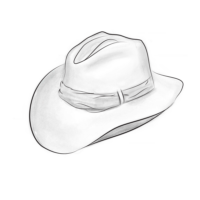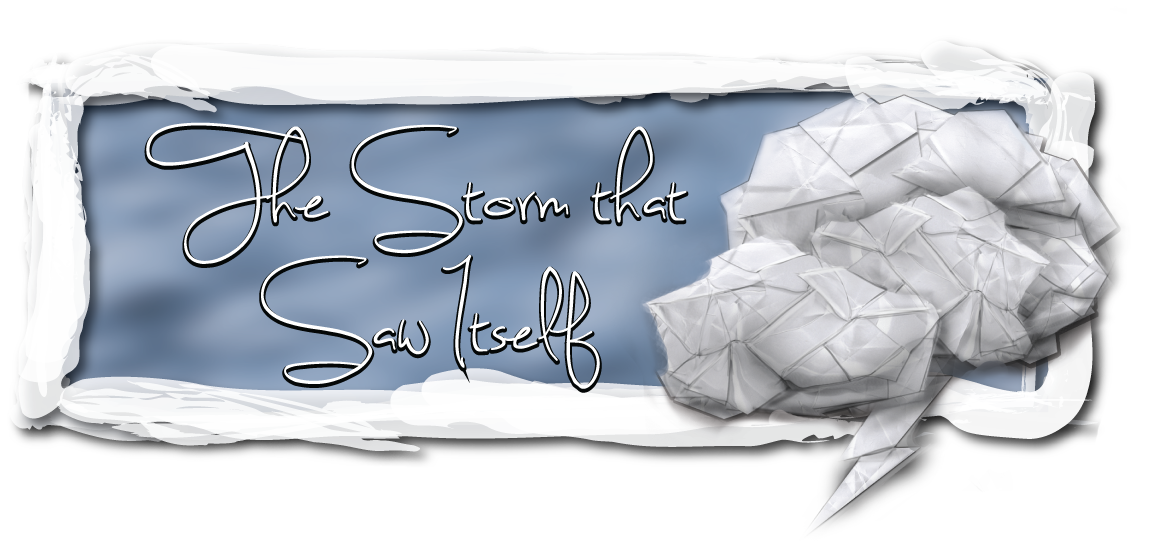– 4 –

It is a few weeks later.
Andrea is in her room. She is dancing, thoughtfully, with herself; but after the style that she might dance with Peter.
Edmund is staring at her from the open door.
She turns. She looks at him.
“Do you think —” she starts to say.
He holds his finger to his lips.
He walks in. He closes the door. He says, softly, “Andrea, would you like your freedom?”
She tilts her head to one side. “Of cour—”
He rips her chains.
Her mouth opens. She discharges the lightning. It fills the room; it bursts it; it arcs out, loop by endless loop of it, shatters the window, fries the screen, and pours into the sky.
He rips open the ribcage of her human body. He crushes flat the spikes. He shatters the eyebones and still the lightning pours from her.
Now and again it touches him; it burns him; it sears him; but if it touches him too long he bites at it, swallows the forked and bladed edges of it, and it howls and slips away.
He spears his fingers through the eyes of the ghost-duck. He wrings its neck, counterclockwise, and unwhisks it. The spirit dissipates. It’s . . .
That’s good, I guess?
It’s . . . I mean, logically, it would be good, wouldn’t it? To un-whisk a duck? I know it’s good when you unplug a cow or make dull a goat with primary education and heavy lager.
I don’t actually know how to describe this scene from a moral vantage except that he does it, and he is Edmund, and she is the nithrid.
I would be more inclined to approve if it weren’t for the fact that he’s eating spurs of her ribs now. I’d be all, “well, sometimes you have to be visceral to be kind,” except, oh, God, Edmund, that thing you are doing with her eyeball is just gross.
It is a brutal room.
It is a bloody scene.
It makes you remember that wolves are wild creatures, wolves and gold, and you must not trust an aristocrat who has been raised by an acid-drooling wolf not to go berserk and start ripping people open if you are ever in a situation where self-control of that sort will be demanded.
Meanwhile Peter has new boots.
He stomps in them.
He has almost entirely recovered from being irritated at the presence of the antichrist at his school. He has almost entirely forgiven Edmund for being such a jerk as to be friends with said antichrist. It is not really Edmund’s fault. The boy has just had bad influences.
He stomps, and he imagines scissors.
He imagines them spindling. He imagines them crumpling. He is the rock against which their scissorsy ambitions shall crumble, denature, and fall.
He sighs happily.
There is something in a boot that loves to stomp. There is something in a boot’s nature that calls for it. It exerts a subtle, cumulative pressure upon the wearer; and to release that stress by stomping is a supernal pleasure. If boots could wear boots, and those boots could wear the original boots —
If you’re a little confused by how that would work topologically, please imagine that there is an explanatory diagram and that I am pointing you helpfully in its direction —
Then they would fulfill one another in an endless stomping frenzy of orgiastic glee.
They would roll across the world, they would know great fury, and nothing stompable would be safe. Grapes would turn to grape juice, and eventually to wine. Paper towers would be stomped flat. Paris seems kind of fragile. It would probably just get bum-plain paved over when the stomping boots rolled by.
The Pope looks up! He screams!
Why did he even go to Paris? The Pope should be in Rome! Rome, Pope! Rome!
The Pope screams anyway. Perhaps it is a premonition.
Thus lies the story of the boot.
It’s not all imaginary boots strapping each other on and pulling themselves up into a storm like feet, though. There’s real stomping involved, too. Listen.
The end of Fenris, prophecy says, is the boot. That wolf’s going to get stomped. Boot to the head? Shoe to the tongue? Even the hunger of the wolf can fail against the brutal leather of a really gigantic shoe.
The end of the Lethal Magnet School for Wayward Youth, too.
Nostradamus had said it. He’d prognosticated it.
If there should be a Lethal Magnet School for Wayward Youth in England, in a certain year, the boot shall come.
Lest all this talk of stomping seem overly focused on the future, we must remember Pompeii, stomped by the fiery boot of Heaven; or Atlantis; or that adorable little rabbit, you know, the one that got stomped.
I don’t even want to think about it!
That poor bunny!
It was going to be a world-destroying bunny, I guess. I mean, I think Hans had his reasons. But even still.
Sometimes I like to dig it out of the cavernous depths of the earth, hold it against my chest, rock it gently, and tell it that when the Rapture comes surely an innocent bunny like itself will be given new divine flesh and spirit, even if it’s at the expense of one of the 144,000 fundamentalist Christians otherwise destined to know Heaven.
This is a logical, reasonable activity!
Magical jaguars in a decaying orbit around the Earth have probably already eaten those Christians’ tickets into Heaven anyway.
Peter stomps.
Peter stomps in accordance with the fundamental rules for boots.
Then he throws open Andrea’s door. He cries, “Andrea! Look! I have new boots! I’m stomping in them!”
Andrea is, unusually, being eaten.


